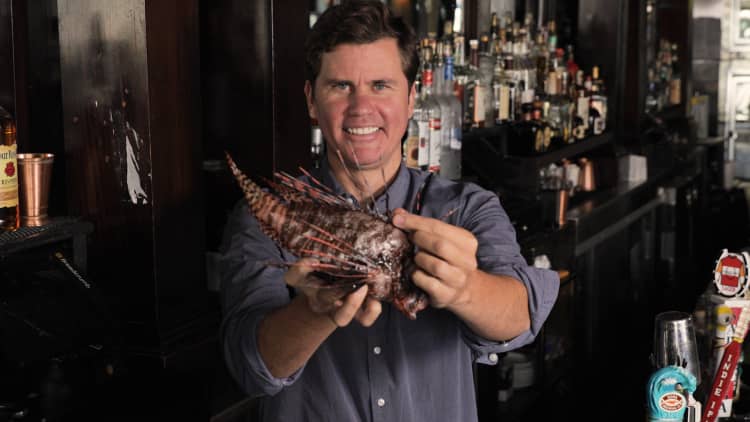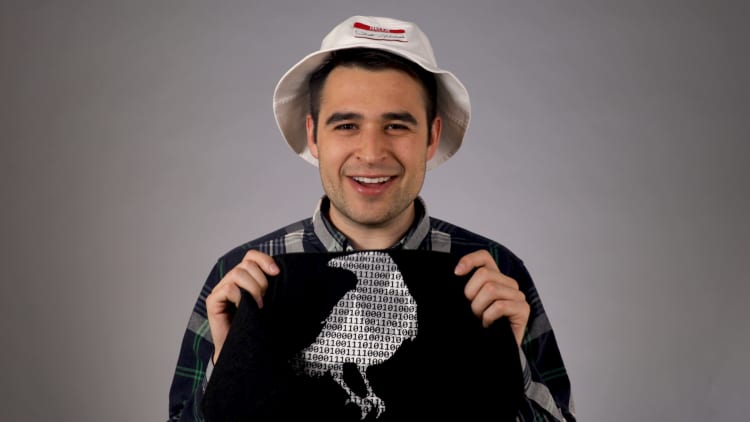As a reporter at CNBC Make It who's covered some of the most incredible ways people have made money online — including a 28-year-old whose company has made millions buying things at Walmart and reselling them on Amazon and an entrepreneur who started selling board games out of his living room — I was curious to find out if it was as easy as they made it seem.
Could someone like myself with no prior experience actually start a successful business with little time to spare and even less money?
With a budget of less than $1,000, two weeks time to launch something and a plan to donate all profits to charity, I set out to find the answer.
In week one of the experiment, I landed on the idea of selling crypto-themed apparel. In week two, I bought a domain, created designs to print on shirts and set up a Shopify account linked with print-on-demand service Printful to minimize the amount of labor I'd have to do once the business was up and running. I won't have to fulfill, print or ship anything myself.
Setting up the whole business — from site, to designs, to LLC to bank accounts — took about 50 hours of work and cost me less than $600.
Then, on April 19, I launched CryptoCrow.co.
With the first two parts of my challenge complete, I set my eyes on the third and looked to ramp up marketing efforts in order to maximize profits.
Following the advice of Trevor Chapman, an e-commerce expert who had his company acquired for over $10 million, I planned to use Reddit posts to help spread the message about CryptoCrow.co.
The first post that went up in the /r/Bitcoin subreddit a day after launch garnered over 5,000 views. The traffic led to one sale, then two, then nine by day's end.
"You just have a cash generating machine," Chapman tells me. "It's kind of like the dream scenario."
And to be fair, it did feel like a dream. Every hour or so after posting, another Shopify notification would pop up on my phone explaining that a human somewhere in the world wanted to pay $20 for one of my shirts. I even woke up to sales that closed while I was sleeping — another $20 in profit.
The dream didn't last long, however. I wore out my welcome in other subreddits that weren't as receptive to what was seen as an advertising ploy. One user commented, "it's getting annoying, to the stage I don't want to support it lol."
Plenty of others who saw my posts disagreed — to the tune of over $1,200 in sales just after CryptoCrow.co's first week. In all, the work amounted to about a 40 percent profit margin (after Shopify and Printful took their cuts).
Another Redditor, entrepreneur Mubashar Iqbal, even offered to help profile my shop on Product Hunt, a site dedicated to showcasing noteworthy startups. It received some attention, but ultimately only led to one sale.
Testing an early business idea with your target audience on sites like Reddit and Product Hunt makes sense when launching, but it doesn't compare to the sustainability and automation of Facebook's platform, according to Chapman.
"Facebook is great to acquire customers because you can hone down so insanely well," he says. "The data on each individual is astounding. … Before, this kind of consumer targeting would have cost hundreds of millions of dollars." It's a large part of what Chapman teaches in his online marketing course, Academy of Arbitrage.
The first thing that struck me about using Facebook Business's ad platform was that it's surprisingly cheap. At a minimum cost of $1 a day, I could target those who were interested in cryptocurrency, then further limit age ranges, gender, income levels and even, you guessed it, political affiliation.
Using photos of some of my bestsellers, I was able to launch ads that track when and how often people click through to my site in just a matter of hours. It was also fairly easy to duplicate those ads over to Instagram. The ease of use might be one reason why in a CNBC survey, more than four in 10 small-business retailers (42 percent) said they had advertised on Facebook within the past few months.
Using both, I set a budget of just $3 a day and let Facebook take care of the rest. Unfortunately, the Facebook ads I tested weren't met with nearly the same success as the Reddit posts and no sales have yet come in as a result. Chapman assures me that iterating on ads to find what works is all part of the process.
"Let the market decide what t-shirt they want to wear, cut all the rest and then focus on that one driving product," he says, adding that an ideal goal would be returning three times the total amount I spend on ads in revenue.
That much at the onset seems like a lofty goal. But then again — considering the fact that three weeks ago all I had was an idea, maybe, just maybe, there's hope CryptoCrow.co can continue in its quest to deliver the internet's best crypto apparel.
Follow the progress on our side hustle here. Next up: We look at other ways to grow a newly established e-commerce business.
— Video by Zack Guzman.
Like this story? Like CNBC Make It on Facebook.




